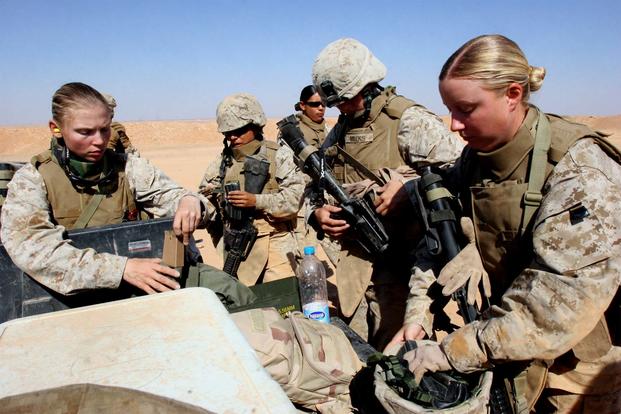There are 278 female Marines now filling jobs formerly reserved for men, with 40 female recruits additionally under contract for these jobs, the assistant commandant of the Marine Corps told reporters at the Pentagon on Tuesday.
A year and a half after all previously closed ground combat and special operations jobs across the Defense Department opened to women in keeping with a Pentagon mandate, Lt. Gen. Glenn Walters hailed the progress that Marines have made in integrating the ranks, saying the Corps has not gotten adequate credit in the press for recent historic milestones.
These include two female lieutenants who graduated with honors from Army Field Artillery School at Fort Sill, Oklahoma, in May 2016, and the Marines' first female tank officer, 2nd Lt. Lillian Polatchek, who graduated at the top of the Army's Armor Basic Officer Leaders Course at Fort Benning, Georgia, in April.
"Do we have hordes [of female Marines entering combat jobs]? No," Walters said. "But we have a pretty good nexus that are attempting to make these choices in life. And I'm very proud of them."
There are at least three women currently serving in actual enlisted infantry jobs. The Marine Corps revealed in January that a female rifleman, mortarman, and machine gunner were being assigned to 1st Battalion, 8th Marines, out of Camp Lejeune, North Carolina.
And Walters revealed Tuesday that a female officer is currently attempting the notoriously difficult infantry officers course at Quantico, Virginia, and had made it partway through. As of this spring, 31 female Marine officers had attempted the course, but none had been able to complete it.
Walters' comments come as the Marine Corps eyes a plan that would allow women to attend Marine Combat Training, and potentially boot camp, on the West Coast. The service is also considering further integrating gender-separated training and instruction periods at Marine Corps Recruit Depot Parris Island, South Carolina, the only boot camp where female Marine recruits currently train.
The prospective changes are part of a massive effort to change the culture of the Marine Corps to promote respect for women on and off the clock. The service stood up a task force to address the issue after an investigative report in March found that active-duty Marines were using a private Facebook group to share nude photos of female troops without their consent.
A new Personnel Studies and Oversight office has been established to continue the effort, Walters said. He revealed as well that Commandant Gen. Robert Neller had designated the office of the assistant commandant as the "talent management officer of the Marine Corps," a role that entails diversity management and oversight of how jobs are assigned.
"I have a duty to look at where we place people, why we place them there, to find out if there's any policy imbalances that we need to adjust and how do we manage the talent of the Marine Corps to achieve our cultural objectives," Walters said. "And I will use that power and authority to help effect the change we're talking about now."
Walters said evidence-based analysis around Marine Corps recruit training is taking place to assess the costs and benefits of further gender integration. The Marine Corps is the only service that continues to keep elements of boot camp separated by gender, and officials have said this approach minimizes distractions and allows recruits to bond with same-gender role models.
Critics have said the approach allows male Marines to look down on their female counterparts and engenders a culture of sexism.
"If we're going to change the culture of the Marine Corps, we need to change how we're organized," Walters said. "Our recruit training is a component of that, and of course we're looking at all options."
-- Hope Hodge Seck can be reached at hope.seck@military.com. Follow her on Twitter at @HopeSeck.
Related Video:
Two Minute Brief: Women in the U.S. Military





























